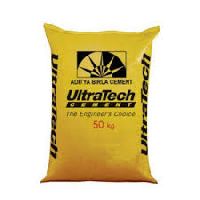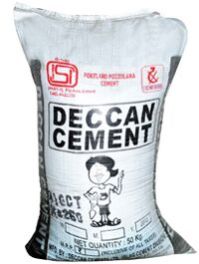
Sulphate Resistant Cement
It is a specialty cement manufactured as per specifications originally formulated by the Indian Railways vide their specification No.IRS T-40 for manufacturing concrete sleepers. However, there was an amendment (No.6) to IS 12269, IRS T-40 cement and then, this was brought under the ambit of BIS. It is now designated as 53-S Ordinary Portland Cement and conforms to BIS specification IS:12269-1987. 53-S OPC's negligible chloride content protects it against corrosion. High fineness enhances workability and high early strength enables improved mass production cycle of Railway Sleepers. Apart from its main usage in the manufacture of concrete sleepers, it can also be put to use in pretest concrete elements or high rise buildings where high early strength is required.Deccan Cements is one of the few manufacturers approved by the Research Designs and Standards Organisation (RDSO) of Indian Railways to manufacture and supply this special grade of superfine cement having enhanced quality and performance characteristics required in the production of Railway Sleepers.This type of specialty cement has to conform to BIS specifications IS:12330:1988. As the name indicates it resists sulphate attacks to which Ordinary Portland Cement is highly vulnerable. Being specially formulated cement with low C3A content, it can withstand sulphate attack.
...more
railway sleeper cement
This type of specialty cement is manufactured according to BIS specifications IS-8041:1990. The name by itself is an explanation of the nature of the cement i.e. it gets hardened at a very rapid pace. Apart from rapid hardening, it also develops high strength at an early stage than even OPC 53. It is used in pre-fabricated concrete construction work or in situations where Form Work has to be removed for reuse at a fast rate or some times in road repair works too.
...more
Pvc Cement
Portland Slag Cement is blended cement consisting of intimately inter-ground mixture of Portland cement clinker and granulated blast furnace slag, or an intimate and uniform blend of Portland cement and fine granulated blast furnace slag, together with required quantity of gypsum, in which the amount of slag constituent is within the specified limit. Using ground slag to replace a portion of clinker in manufacturing Portland cement is a useful method to make concrete better and more consistent. Among the measurable improvements are:
...more
Ppc Cement
PPC is special blended cement useful in general construction work and is especially suitable for applications in aggressive environmental conditions. It can be confidently employed in construction of hydraulic structures, marine works, mass concreting such as dams, dykes, retaining walls foundations and sewage pipes. It is also suitable for use in common applications such as masonry mortars and plastering.
...more
Pozzolana cement
PPC is special blended cement useful in general construction work and is especially suitable for applications in aggressive environmental conditions. It can be confidently employed in construction of hydraulic structures, marine works, mass concreting such as dams, dykes, retaining walls foundations and sewage pipes. It is also suitable for use in common applications such as masonry mortars and plastering.PPC with fly ash as Pozzolana is more popular in the country owing to the easy availability of quality fly ash from modern coal-based thermal power plant. With the advent of fly ash based PPC, the availability and use of calcined clay based PPC has more or less been decimated.
...more
Portland Slag Cement
Portland Slag Cement is blended cement consisting of intimately inter-ground mixture of Portland cement clinker and granulated blast furnace slag, or an intimate and uniform blend of Portland cement and fine granulated blast furnace slag, together with required quantity of gypsum, in which the amount of slag constituent is within the specified limit.PSC is defined by BIS specifications IS:4551989. Portland slag cement is nowadays commonly used in general civil engineering construction works and is mainly preferred for construction of main structures and in coastal areas where excessive amount of chloride and sulphate are present. It is most useful in massive construction projects such as dams. Its significant properties like resistance to chemical attack makes it most suitable for usage in water retainer structures and structures which are vulnerable to any form of chemical attack.
...more
Portland Pozzolana Cement
PPC provides improved workability, has less segregation and bleeding, increased water-tightness and reduced tendency of lime to leach out. It produces less heat of hydration and offers greater resistance to the attack of aggressive water containing sulphates and chlorides. It improves the durability of structures and also the strength of concrete over a period of time by making it more corrosion resistant and impermeable. It protects concrete against alkali-aggregate reaction.The minimum compressive strength of PPC after 28 days, as prescribed by BIS is 33 MPa or 330 kg Cm2. However, the ultimate, long-term strength of PPC is better compared to OPC 53. Since the pozzolanic material reacts with calcium hydroxide liberated by the hydrating Portland cement and forms cementatious compounds, PPC makes the concrete more impermeable and denser as compared to OPC and it is this property coupled with its cost effectiveness that has helped in its emerging more popular in the construction industry.
...more
Ordinary Portland Cement
Bureau of Indian Standards (BIS) has classified OPC into 3 different grades namely, OPC 33 Grade, OPC 43 Grade and OPC 53 Grade cements. The grade number indicates the minimum compressive strength that the cement is required to attain at the end of 28 days eg., the minimum compressive strength of 53 Grade OPC attained on the 28th day shall not be less than 53 MPa or 530 kgsqcm. It may be noted that OPC 33, OPC 43 and OPC 53 grades do not differ in chemical content. The only difference is that the higher grade cements are ground much finer during the final grinding process, creating a product that is much stronger and more durable than the less finely ground cement.
...more
OPC Cement
It is a specialty cement manufactured as per specifications originally formulated by the Indian Railways vide their specification No.IRS T-40 for manufacturing concrete sleepers. However, there was an amendment (No.6) to IS 12269, IRS T-40 cement and then, this was brought under the ambit of BIS. It is now designated as 53-S Ordinary Portland Cement and conforms to BIS specification IS:12269-1987. 53-S OPC's negligible chloride content protects it against corrosion. High fineness enhances workability and high early strength enables improved mass production cycle of Railway Sleepers. Apart from its main usage in the manufacture of concrete sleepers, it can also be put to use in pretest concrete elements or high rise buildings where high early strength is required.
...more
Specialty Cements
Be first to Rate
Rate ThisOpening Hours